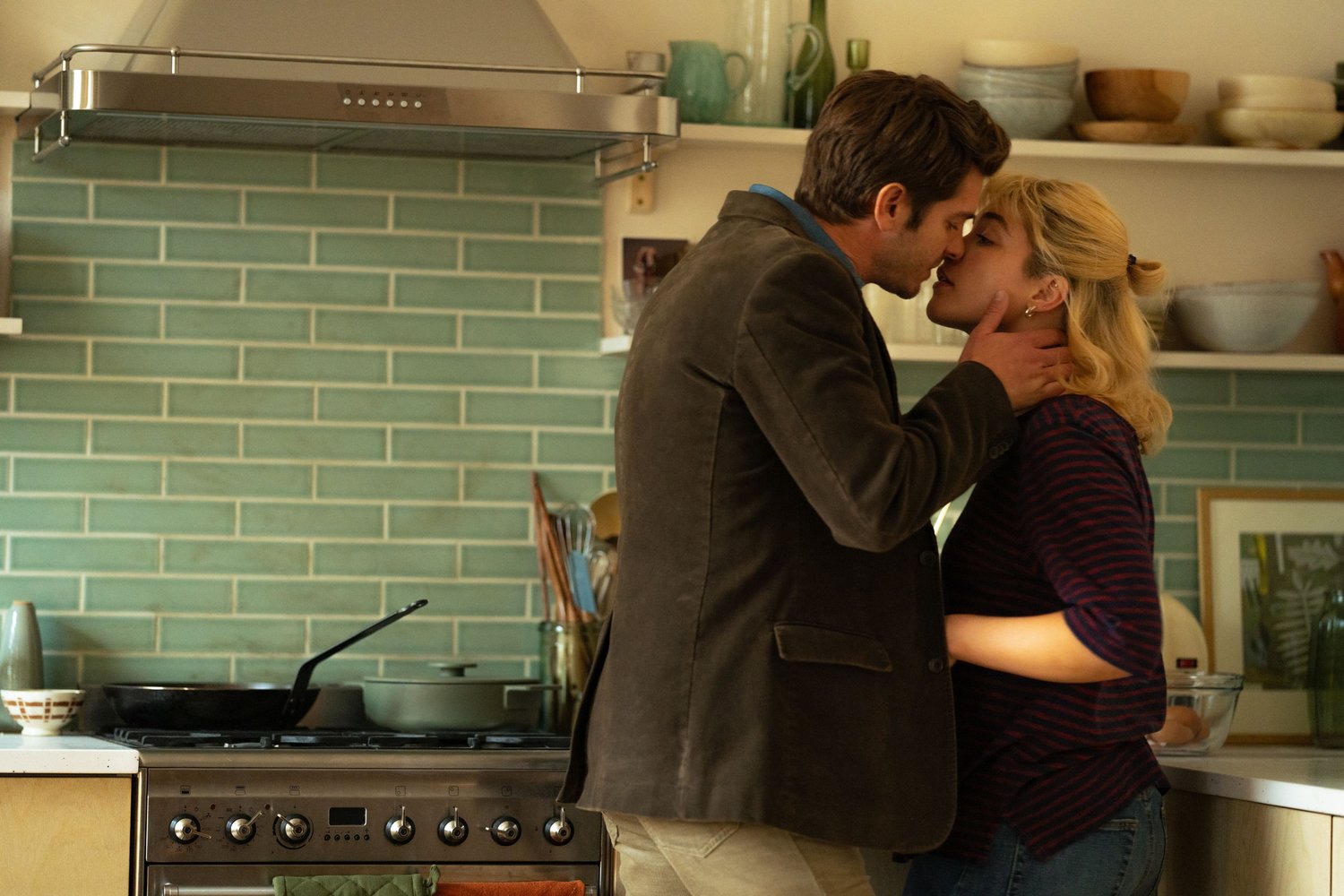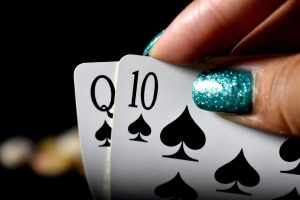Images by Peter Mountain courtesy of A24 Films
WE LIVE IN TIME– 5 STARS
LESSON #1: MEMORIES ARE AS IRREGULAR AS LIFE ITSELF– Ask any pair of people in a long-term relationship about memories and they’ll tell you how they rise and recede in one’s mind at any time. The callbacks and triggers are random. Some are slow and methodical and others anxiously sting like thunderclaps. Their tangents ebb and flow between happiness and sadness like life itself where the memories emanated from. The endlessly romantic new A24 film We Live in Time recognizes that irregularity and saunters from one waltzing memory to another across a decade’s span of one passionate relationship.
Two-time Best Actor Oscar nominee Andrew Garfield (in his first film role since his 2021 triple-header of The Eye of Tammy Faye, tick, tick…BOOM!, and Spider-Man: No Way Home) plays Tobias Durand, a business rep for Weetabix Limited as plain and regular as the products he shills. His significant other is fellow Academy Award nominee Florence Pugh’s spirited top-shelf modern Bavarian chef Almut Brühl. We Live in Time introduces them within their domestic home lives on the English countryside sharing a lovely daughter named Ella (Grace Delaney) only for their bliss to broken by a bout of stomach pain for Almut. An ensuing doctor’s appointment reveals the return of Stage 3 ovarian cancer in the form of a tumor too large to remove with ordinary surgery.
This jarring news arrives very early in the film, skipping many traditional steps for viewers still coming to know Tobias and Almut. Emulating that aforementioned randomness of recall, We Live in Time is intentionally presented in a non-periodic fashion which, after this opening’s perilous development, takes some acclimation time to absorb. Before long, a keen viewer will spot the setting, makeup, and costuming cues that inform when and where the film’s scenes fit together into place. To some, this plot construction could be seen as a gimmick of shortcuts to hide missing breadth or incomplete stamina, which is not the case. Rather, the unbound narrative creates an artful mystery that reinforces the amorous bond between Pugh and Garfield that only grows thicker with every shared scene. Nevertheless, a patience for satisfaction and culmination is both necessary and welcome.
LESSON #2: SHARING EACH OTHER’S HIGH AND LOWS– Liken this serpentine route through life taken by We Live in Time as piece of hooped embroidery made by two threads of different fibers. The beautiful front-facing side was completed one stitch at a time and not in a top-to-bottom sequence. Turning the hoop over reveals the unseen and erratic hops, skips, and jumps between elements and colors. In We Live in Time, its stitched history of knots are made by divorce, courtship, elation, arguments, grand gestures, pregnancy battles, gut punches, parenting woes, and professional successes and failures—all entirely shared by our central couple with grace, humor, vigor, and devotion.
Once again, it would be easy to see We Live in Time as a scheme cherry-picking only the key highest and lowest moments of its romance and scrambling them for the sake of a guessing game. Brooklyn director John Crowley, working from a screenplay by Tony Award-nominated playwright Nick Payne, indeed circles We Live in Time around to present common cornerstones like the Meet Cute, a baby delivery, and more. However, the real dramatic enchantment is how Payne and the slight score from Sing Sing composer Bryce Dessner surround those core memories with, persistently, the less showy parts of life that make up the scrambled back of the embroidery. The bulk of those complementary scenes boil down to another part of the human condition as irregular as memories.
LESSON #3: THE DICHOTOMY OF CONSIDERATIONS AND THEIR IMPLICATIONS– All of life’s peaks and valleys start with questions of consideration. Long-term relationships, such as the one between Almut and Tobias in We Live in Time, sit within and act on all sorts of possible sliding door decisions and then face the dichotomies found in their resulting implications. There are the choices you take and the ones you don’t. There are small considerations that can be readily answered and other larger or sterner considerations that cannot be finalized so easily. While many decision points shown in the film are extremely relatable on many levels, the full gamut of the considerations is still unique to this on-screen partnership.
Taken altogether, We Live in Time becomes a cherished journey of two committed lovers talking out and feeling out those many considerations of life, starting with Almut and Tobias weighing the debate between quality-versus-quantity options for this latest recurrence of cancer. There’s a spoken thought to have six resigned but amazing months free of medical interventions or twelve miserable months of chemotherapy, since both could lead to the same possible grim conclusion. Every decision of consequence branches from there, like if it’s finally time to get married or how do they go about telling their innocent child one of their parents is dying. Thanks to the nonlinear flow, none of it transpires in a simple fashion, and, goodness gracious, tissues are an absolute must for this crusher.
LESSON #4: THE BEAUTY AND POWER OF SUPPORTIVE PARTNERS– Going through this heartbreaking ordeal, you fall in love with these two characters not only in the big moments of rapture, of which there are plenty, but in those little ones where it’s simply the two of them finding their unity and initiative to move forward. After all, true partners are found in honest talk more than pillow talk. Goddamn, the way Andrew Garfield looks at Florence Pugh is simply everything in We Live in Time. Prepare for the GIFs and memes of his expressions setting hearts aflutter, only to see them matched by Florence’s knee-weakening, sparkling, and smirking responses given in return. Messy and loyal, confident but vulnerable–matching the movie itself— they are what loving supportiveness and perfect, alluring endearment look like.
LOGO DESIGNED BY MEENTS ILLUSTRATED (#1237)



